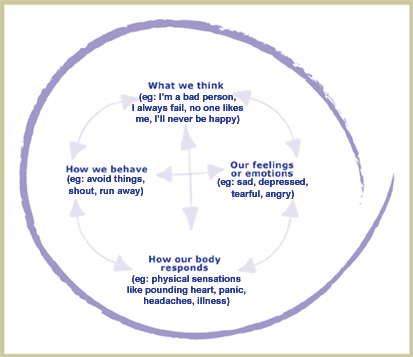 CBT is a way of talking about: CBT is a way of talking about:
CBT can help you to make sense of overwhelming problems by breaking them down into smaller parts. This makes it easier to see how they are connected and how they affect you.
How you think about a problem can affect how you feel physically and emotionally. It can also alter what you do about it. There are helpful and unhelpful ways of reacting to most situations,
depending
on how you think about them.
The whole sequence, and parts of it, can also feed back as shown in the diagram:
This "vicious circle" can make you feel worse. You can start to believe quite unrealistic (and unpleasant) things about yourself. This happens because, when we are distressed, we are more likely to jump to conclusions and to interpret things in extreme and unhelpful ways.
CBT can help you to break this vicious circle of altered thoughts, feelings and behaviour.
When you see the parts of the sequence clearly, you can change them - and so change the way you feel. CBT aims to get you to a point where you can "do it yourself", and work out your own ways of tackling these problems.
A course may be from 6 weeks to 6 months or even longer. It will depend on the type of problem and how it is working for you.
We will have an intial assessment to discuss your needs. You will decide your aims and how often you want appointments.
Things about CBT you need to consider
- CBT is not a quick fix
Therapy is about change - remember the therapist cannot 'do' it for you
- Therapy is a huge commitment and hard work - you need to decide whether this is 'the time' to commit to it
- To overcome emotional problems you need to confront them. This may lead you an initial increase in symptoms before you begin to see change - in other words you may feel worse before feeling better.
|

 CBT is a way of talking about:
CBT is a way of talking about: